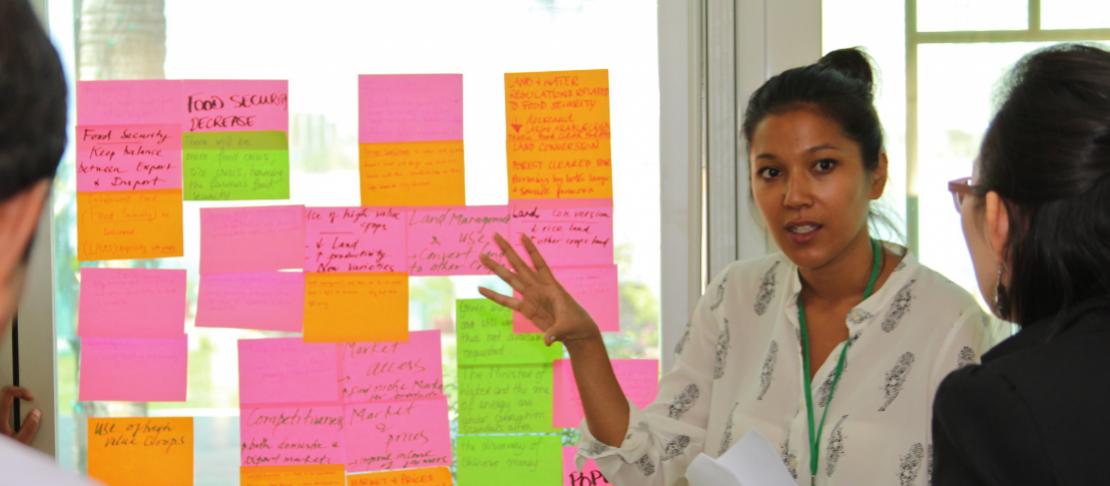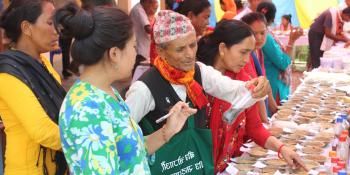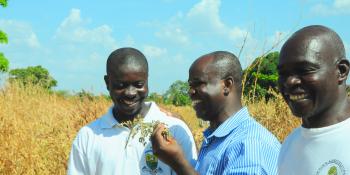Foresight for future-resilient policies in agriculture

Policy change is increasingly being recognized as a key factor that is needed for sustainable food systems. In Southeast Asia, during the recent Independent Summit Dialogue* convened under the United Nations Food Systems Summit dialogue process, policy change was ranked the 4th most important element to solve the issues around climate change and agriculture.
More than 650 key stakeholders from 80 different countries joined the event from state and non-state institutions, policy research institutions, universities, farmer organizations, agribusinesses, agricultural financing institutions, the civil society, oversight bodies and the media.
To me as well, reflecting on the past nine years working in the field of foresight and food systems in Southeast Asia, policy remains a priority.
In Southeast Asia, climate change is undoubtedly a major aspect of public policy and a key focus of environmental legislation. From 2010 to 2018, in the five most vulnerable countries of the Association of Southeast Asian Nations (ASEAN) that ratified the Paris Agreement—Vietnam, the Philippines, Cambodia, Indonesia and Laos—67 climate change-related national laws and policies were passed. For example, Cambodia adopted its Climate Change Agriculture Plan in 2016 which addresses multiple sectors and recognizes the threat of climate change.
Imagining different plausible futures
Surrounded by competing priorities, limited resources and a complex and multi-dynamic changing environment, governments are searching for new planning tools to meet multiple economic, political, social, environmental and climate change challenges. Policymakers are increasingly using foresight to imagine and experiment with multiple future climate conditions and amplify the robustness of adaptation planning under multiple uncertainties and longer timeframe.
Foresight is a label for methods that aim to explore what the future might bring, with most foresight approaches focusing on the use of multiple alternative scenarios to explore future directions of multiple drivers of change. Foresight is a strategic planning tool that improves decision-making and also helps to accelerate information exchange among the stakeholders of the food systems. It adds legitimacy to proposed plans or strategies and supports the formulation of future-resilient policies.
With my position as CCAFS Scenarios Coordinator, I have been in the frontline of foresight in actions. I have been involved with numerous and diverse legislative processes from supporting the drafting of a collective vision on sustainable food systems in Cambodia, testing strategies against multiple plausible scenarios, reviewing national action and investment plans in Cambodia, Lao PDR and Vietnam, to reviewing and prioritizing implementation pathways with robust activities promoting climate-smart agriculture in Vietnam and the Philippines. While the policy outcomes and processes differed, the use of foresight methods and approaches to develop robust and actionable plans were welcomed by most of the policymakers.
Beyond foresight for future-resilient agriculture policies
Applying a foresight approach to policymaking processes has proven to strengthen governments’ ability to prepare against uncertainties and for the unexpected. In agriculture, climate foresight has been used to legitimize the need for new or revised agriculture policies that ensure comprehensive development pathways addressing the vast range of climate impacts across sectors, such as future-resilient agriculture policies.
While developing robust policy is crucial to enable climate change actions, this is not enough. Without good governance those policies will fail to become political priorities, implemented and reinforced. From my experience, the term policy has been too often used as a synonym of governance, but unfortunately, future-resilient policy doesn’t pair automatically with good governance. The value of future-resilient agriculture policies lies in how these policies are implemented and are proven to be actionable. Realizing the potentialities of it requires us to demand not only future-resilient policies but an upgrade of how we think about our futures and identify values that can structure and drive those ambitious calls and actions.
The Independent Summit Dialogue was convened by the Association of Southeast Asian Nations Climate Resilience Network (ASEAN-CRN) in partnership with the Global Coalition on Climate-Smart Agriculture (GACSA) and the Food and Agriculture Organization of the United Nations Regional Office for Asia and the Pacific (FAO RAP).



